Mathematicians Anonymous (Or Not So Anonymous)
Hello, everyone. I'm Matt, and I'm a mathematician. I've been a mathematician for the last 12 years. The last theorem I proved was today (holds up his Theorem-Proving Chip). 0 is the only number that matters as that is the last day since I've been a mathematician. In fact, all of mathematics can be constructed from nothing. I have a much deeper understanding of creation ex nihilo.
sits back down
Heed My Words!
For those in the academy or considering pursuing a career in the academy after obtaining a bachelor's degree, I would like to offer some meaningful advice.
DON'T DO IT!
Now that you've decided to ignore my suggestion, let me describe some insights that I learned from being a math postdoc. I spent the last 18 months bouncing between 3 different postdocs before completely switching to a new area within IBM Research and doing High Performance Computing, i.e. designing parallel algorithms for scientific applications to be used on large-scale super computers that do the majority of the calculations on Graphical Processing Units (GPUs).
Now I Program These Bad Boys
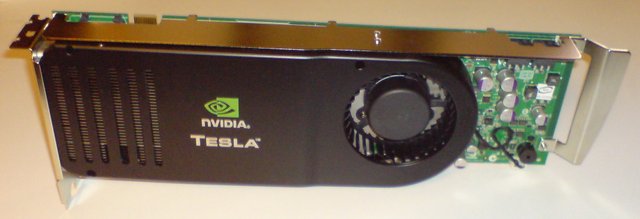
Postdoc Life
Postdoctoral life is very different from graduate student life, although very much the same. You have much more freedom to choose the research that interests you, beyond a project that your supervisor hands to you. For those who are self-motivated and intellectually curious, this freedom can be highly beneficial. It can also hurt your career if not nurtured properly. The publish or perish paradigm still exists, and you are expected to produce results on your latest scientific inquiries, even if you do not believe the work is significant. All in all, this part of the job is marketing your research as a product. You do not want to say that it was trivial in hindsight (most of the best results are!) nor do you want to expand on 'failed results' (although, I think that knowing what does not work is almost as good or even better than knowing what does work).
I spent anywhere from 40-80 hours a week consumed by mathematics, either by reading papers, thinking about various problems, or investigating various phenomena. This does not include attending conferences and seminars or interacting with other (visiting) scientists at the institutions where I held a visiting position.
Looking back at it now, I should have spent more time networking and writing papers. In fact, I believe this to be the biggest way of landing any job.
Applied Algebraic Geometry
As a mathematician and a scientist, I find (nearly) everything fascinating. You can easily scratch the surface without digging too deeply in most disciplines and research a topic that interests you. The biggest hurdle is researching a known concept and presenting unknown connections to the community at large. Because of the sheer volume of literature that exists, this task can be daunting!
My original area of study (beyond general mathematics) is in Applied Algebraic Geometry, specifically finding all the solutions of a system of nonlinear polynomials using numerical homotopy continuation methods. My expertise (meaning, my dissertation subject, which practically very few other people in the entire world truly understood) was in finding the solutions to polynomial systems with the same monomial structure but with different coefficients and implementing such algorithms in parallel, as well as other algorithmic development specific to certain scientific applications.
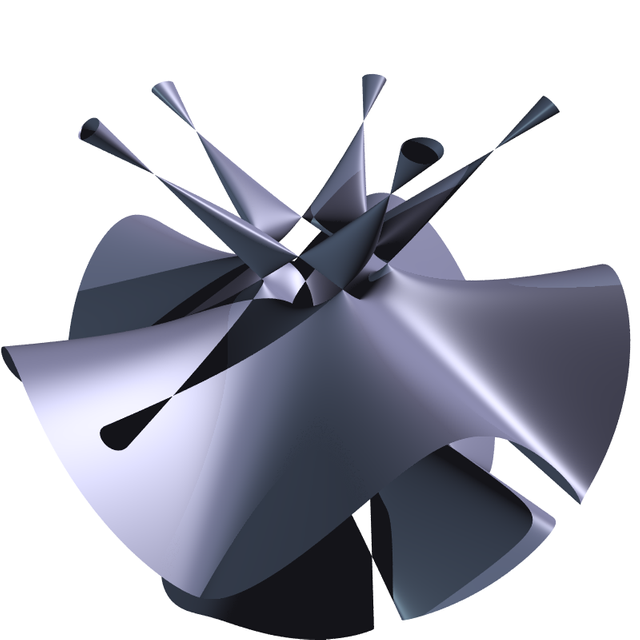
I was fortunate enough to spend much of those 18 months studying problems of interest to me, loosely related to applied algebraic geometry, and never particularly caring if the ideas I investigated were of interest to the general community at large.
Now, I allocated a good deal of time learning about techniques, algorithms, and pure mathematics in which I was not as well-versed as my dissertation subject, namely symbolic methods and other, more highly advanced concepts in algebraic geometry. Although this advanced my own personal knowledge of mathematics, much of the subject area was already known, and I did not publish too many papers during my postdoctoral days. Maybe one or two a year (which, in mathematics is quite good!), but apparently not quite good enough!
Projections of A-Discriminant Chambers
Discriminants fascinate me! I think they are the bee's knees.
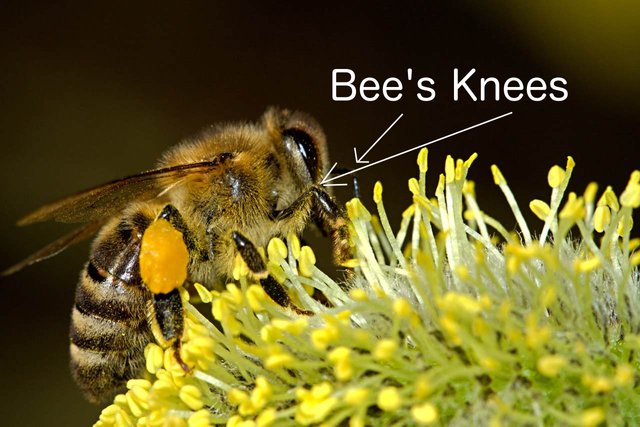
Not quite, I suppose, but they come close.
If you remember the quadratic equation (Ax^2 + Bx + C = 0), the discriminant is B^2 - 4AC and when the discriminant vanishes (i.e. is equal to 0) is precisely when this system has a double root. This concept can be generalized to an arbitrary system of equations in any number of variables. The discriminant of a function F is defined in terms of the (symbolic) coefficients of F. A point on the discriminant variety is then some choice of coefficients that causes a double root or a singularity. Singularity theory is a very difficult subject, especially when you start talking about singularities on quasi-coherent sheafs or on Tangent Bundles or Co-Tangent Bundles or any number of other geometric objects.
The following images are 2 dimensional projections onto the coefficient-parameter space. Each pixel is one point on the coefficient-parameter space in an evenly distributed discretization. Coefficient-parameter points that are the same color have the same number of real solutions. The boundaries between colors are points the discriminant variety. They are places where 2 real solutions 'degenerates' into one. One one side of the boundary, those two solutions are real and on the other, the two solutions are complex.
Points that are places where multiple chambers intersect are even more special in that these have higher multiplicity structure, i.e. multiplicities of order N, multiple pairs of degeneracies, or any combination of these.
These images were created using data (gigabytes!) generated from bertini and paramotopy and visualized with openGL or MatLab.
Steady States of Crystalline Lattice Structures

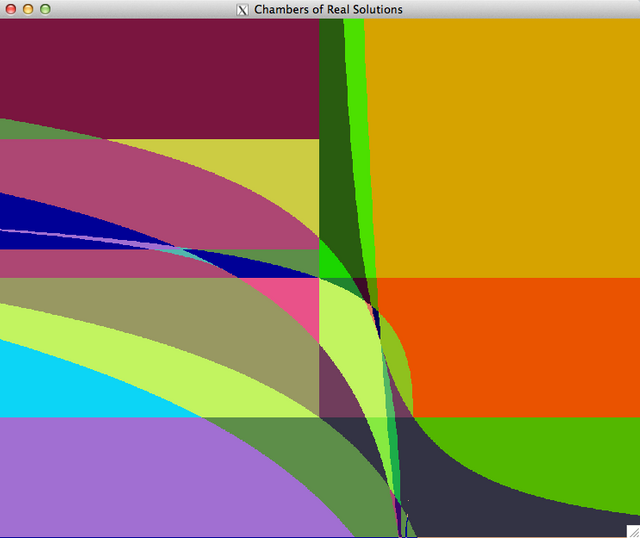
The Monks' Equations
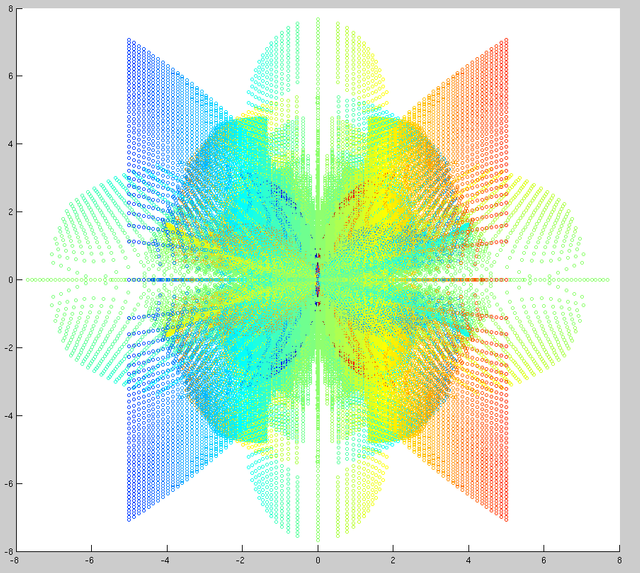
An Amoeba or Approaching a Tropical Line in the Limit
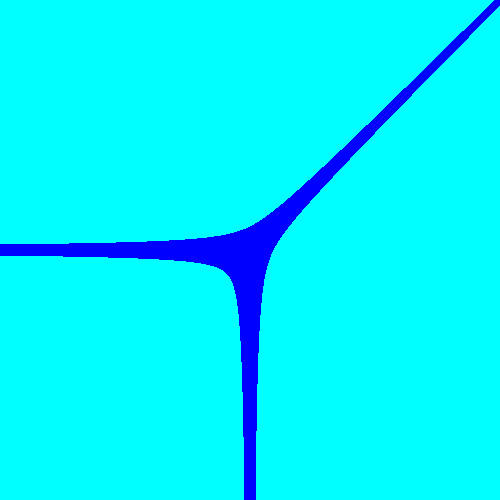
Achieving Success as a Postdoc
In mathematics (and computer science and all other disciplines), posing well-defined questions is probably the main key to success. The other aspect of good scientific research is in story-telling. And finally, all jokes aside, you want to make your research sound as sexy and cool as possible. As an example, the term "dirty data" still makes me chortle. The dirtier the data the better, some say.
Was Math All I Did?
Well, not quite. I organized a hike outside of Daejeon in Korea, visited Seoul (hit a triple Bull's Eye at a bar near the college campus, don't ask me to repeat it, as I don't think I'd ever be able to), tore my knees in the foothills on the backside of Berkeley, saw a Midsummer's Night Dream, managed to see parts of China with my fiancee (@edgeland), explored portions of Toronto and even visited Montreal.
Needless to say, I had lots of fun and learned way more math than I would ever have imagined.
Much of the world sees value in the relationships and networks that you foster with people. Academia is no different, and social outings play an important role in making you more personable.
Looking Over Berkeley and the Bay


Continual Life as a Postdoc
Unfortunately, I did not obtain an academic position (I was aiming for an R1) but landed an industry postdoc job with IBM instead. I'm not complaining. It's challenging research and definitely cutting edge and bears a completely different mentality than life in academia. I have more 'hands-on' experience with scientific applications than I would have before and can bring the insight of my mathematical background and algorithmic development expertise to scientists at Oak Ridge National Laboratory.
What's Next?
What will I do after this postdoc? I'm not sure. I want to say no more postdocs, but nothing is ever certain.
But I do like applications of distributed ledger technologies.
I have a lot of respect for all you have achieved! Your work at IBM sounds fascinating, and sounds like you are applying your knowledge more than just researching further. I think it is balancing that you also took time to hike and explore, and build human relationships.
One question -- it's been ages since I studied math for my engineering degree, but possibly, there is a zero missing in this:
Precisely zero when the quadratic equation has one real double root?
I had to look it up here: https://en.wikipedia.org/wiki/Discriminant and still too rusty to know if you left anything out (zero) or if I am not reading what you wrote correctly!
I am having fun getting into the math and coding involved with steem and steemit, and it is good to be refreshed in things I once knew and move forward to learn new things. Thanks for helping with that!
Downvoting a post can decrease pending rewards and make it less visible. Common reasons:
Submit
Yes. Thanks for catching that. Fixed!
Downvoting a post can decrease pending rewards and make it less visible. Common reasons:
Submit
@complexring Not only a writer but also a genius! Great presentation mate. Since you also love to write stories, take a look at the one I will be posting later and give me your feedback on it!
Downvoting a post can decrease pending rewards and make it less visible. Common reasons:
Submit
I will do my best to provide some insightful feedback. Cheers!
Downvoting a post can decrease pending rewards and make it less visible. Common reasons:
Submit
You're nicer than a day on the beach. (';')
Downvoting a post can decrease pending rewards and make it less visible. Common reasons:
Submit
Hi!I am deng,Welcome to my space
https://steemit.com/@changli-deng
Downvoting a post can decrease pending rewards and make it less visible. Common reasons:
Submit
Well, I can honestly say that I didn't understand the vast majority of your post, but I tried to follow what I could. That is absolutely fantastic that you've found a very specific area of interest (not just mathematics, but very specific aspects of it) that you've been able to make a career out of. I don't think there are many people in this world that truly find what it is they are passionate about in the same way you have with mathematics.
Do you have any plans to teach in the future or do you want to continue to do research?
I good friend of mine is publishing a book in regards to mathematics and the usability, application, and understanding of it through the general public (I think...). I know at one point he had asked if we could sit down to talk about some things so he could add content, but that hasn't happened yet.
I very well could be wrong entirely about the topic, but when I find out more about it I'll let you know.
Downvoting a post can decrease pending rewards and make it less visible. Common reasons:
Submit
Sounds good. Lemme know.
Downvoting a post can decrease pending rewards and make it less visible. Common reasons:
Submit
Your smile makes me smile. (_)
Downvoting a post can decrease pending rewards and make it less visible. Common reasons:
Submit
So, how long do you need to implement public key extraction from ECC signatures on GPUs?
Downvoting a post can decrease pending rewards and make it less visible. Common reasons:
Submit
Good question. I've thought about this for awhile already. I think the biggest hurdle is that I need access to Radeon ATIs and not nVidia. I'm also not sure how performance portable OpenMP or OpenACC is to the Radeon chipset (if at all). If I understand properly, most of the GPU code for bitcoin and other miners is written in openCL.
Downvoting a post can decrease pending rewards and make it less visible. Common reasons:
Submit
Well, if you can do it on NVIDIA chips, that's OK too, I think.
Downvoting a post can decrease pending rewards and make it less visible. Common reasons:
Submit
Fundamentally different problem programming in CUDA vs. openCL. Different hardware and capabilities as well which will affect the design of the algorithm in order to achieve optimal performance.
Downvoting a post can decrease pending rewards and make it less visible. Common reasons:
Submit
Hi. Your post brought up many memories :-) I have a Ph.D. In Theoretical Physics. I specialized in Quantum Chromodynamics and my mathematics areas of interest touched on differential geometry (fiber bundles in particular) and stochastic calculus. I have been a postdoc, and later I got a permanent academic job, but after a few years...I decided to quit! As you point out, being a scientist means being very curious about a wide range of subjects...and sometimes your curiosity (and life at large) moves you away from academia, which is what happened to me. After quitting my academic job, I have been an international consultant, a startupper, and a manager at CERN in Geneva. Maybe I'm just TOO curios. I am trying to settle down now..at the age of 53 :-) Take care.
Downvoting a post can decrease pending rewards and make it less visible. Common reasons:
Submit
I'm interested in how you managed to pursue an international consultation businesses and if you are still doing it.
Downvoting a post can decrease pending rewards and make it less visible. Common reasons:
Submit
Well...it's a long story! My wife and I both left our academic jobs and set up a consulting company which was part of a network of cost reduction consultants. We played the analytical, model-building guys while others were good at hand-shaking with CEOs, etc. At the end of the 90s it was quite fun to make models of e.g. 10 M$/year telecom expenditure for a company and then find ways to reduce costs through a mix of supplier negotiation, process re-engineering and infrastructure rationalisation... Eventually, I discovered that theoretical physicists were regarded as ideal candidates for highly paid strategy consulting jobs....and after quitting my academic job, I was crazy enough to turn down an offer from McKinsey :-) As I said, my professional life is a long, strange story. This is just a chunk of it. Feel free to contact me in private (is this possible on Steemit..?) if you'd like to hear more.
Downvoting a post can decrease pending rewards and make it less visible. Common reasons:
Submit
There are ways of sending messages via memo's when transferring funds. Should be able to encrypt the message, as well. Add the # symbol in front of the message. Let me do a test.
Downvoting a post can decrease pending rewards and make it less visible. Common reasons:
Submit
It hangs for me on the Steemit interface, but I can send via the cli_wallet. Let me verify this test and send you my email.
Downvoting a post can decrease pending rewards and make it less visible. Common reasons:
Submit
Got it. I'll send you an email soon :-)
Downvoting a post can decrease pending rewards and make it less visible. Common reasons:
Submit
Can't really see the encrypted memo now via the Steemit interface. I'll submit a support ticket later tonight to git. I've got a whole list of them ...
Downvoting a post can decrease pending rewards and make it less visible. Common reasons:
Submit
...Those who can, do. Those who can't, teach.
You are now a doer :) Have you done any GPU work with cryptoprojects? I think one of the most interesting projects would be to offload all crypto operations of a bitcoin-qt wallet on a GPU. In this way scaling can benefit significantly because a gpgpu enabled wallet or node will be able to process large blocks with ease. One of the reasons why there's not much bumping up the megabytes of BTC blocks is that it may take too much time to process the transactions. With something like 1000 cores doing 1 verification each, that would be no issue. And, from what I've seen, the maths are mainly multiplications for EC cryptography.
Downvoting a post can decrease pending rewards and make it less visible. Common reasons:
Submit
No, I haven't done any GPU work on crypto-projects.
And yes the maths are mainly EC multiplications ... but isn't the verification already offloaded to ASICs?
Also, I think that this parallel process for verifying EC signatures is what is done already for Bitshares. Maybe it's the same for Graphene as a whole and applies to Steem? I'll need to check into this ...
Downvoting a post can decrease pending rewards and make it less visible. Common reasons:
Submit
ASICs only do the hashing in bitcoin. Verification is still cpu-bound...
Downvoting a post can decrease pending rewards and make it less visible. Common reasons:
Submit
Now I know ...
Downvoting a post can decrease pending rewards and make it less visible. Common reasons:
Submit
Very interesting read. I also got to the post-doc stage of academia before deciding that it wasn't for me and leaving to go freelance. I did a completely different subject - history - but the experience sounds pretty similar. I actually find that being curious and interested in a ton of subjects is easier outside academia than it was inside, because there isn't the pressure to produce finished research at the end.
Downvoting a post can decrease pending rewards and make it less visible. Common reasons:
Submit
Hey, congrats on the post and getting on the TOP 10 Trending articles on Steemit. Just wanted to let you know that I've added your post to the Flipboard Steemit Trending Magazine for everyone to see it. Good stuff!
Downvoting a post can decrease pending rewards and make it less visible. Common reasons:
Submit
Math is the mother of science
Downvoting a post can decrease pending rewards and make it less visible. Common reasons:
Submit
Good abstract!
Downvoting a post can decrease pending rewards and make it less visible. Common reasons:
Submit
Could you please calculate the speed needed to accurately pierce the exact center of a black hole and come out on the other side, theoretically. I'd do it myself if my maths knowledge depth were more than just basic algebra.
Cheers!
Downvoting a post can decrease pending rewards and make it less visible. Common reasons:
Submit
Interesting post. I have a B.S. in Physics and have been at a loss on where to go from here, as many (if not most) jobs are really requiring more education and specifically computer programming. Physics and mathematics go hand-in-hand, and I feel that I have learned so much about how the world works by studying math, but also completely humbled by what other people have achieved. One of the more interesting things being the "light cone" and the beauty of conic sections. Currently interested in hyperbolic geometry, fractals, and black holes. Will that lead to a job for me? Probably not, but there is so many interesting things about mathematics that I hope to understand in my lifetime. Rock on.
Downvoting a post can decrease pending rewards and make it less visible. Common reasons:
Submit
Hello academia,
thank you for giving me the opportunity to read your story. I am pretty sure, whatever you will do you will be successful at.
Would love to hear in few months where your way is heading too.
Good luck!
Downvoting a post can decrease pending rewards and make it less visible. Common reasons:
Submit
👍great post....
Downvoting a post can decrease pending rewards and make it less visible. Common reasons:
Submit
What a pity that I did not understand English, but remembered how to solve quadratic equations.
Downvoting a post can decrease pending rewards and make it less visible. Common reasons:
Submit
Mathematician crew checking in! I want to incentivize more academic discussions here and promote rigorous mathematical thinking in the world. I think it would be great if you start an educational mini lesson series on here to teach the world about your research.
I just started one about antifragility: https://steemit.com/antifragile/@limitless/bitesized-lessons-in-antifragility-1-importance-of-decentralization
Let's make Steemit into the next great MOOC platform!
Downvoting a post can decrease pending rewards and make it less visible. Common reasons:
Submit
I have already started a mini-educational cryptography course. I need to do the next edition! But, yes, in general, I plan on doing this for a wide range of subjects.
Downvoting a post can decrease pending rewards and make it less visible. Common reasons:
Submit
Cool. I recommend you to index them at the end of your posts so that people can see them and easily follow the full series.
Downvoting a post can decrease pending rewards and make it less visible. Common reasons:
Submit
what code (Ax^2 + Bx + C = 0), the discriminant is B^2 - 4AC?
Downvoting a post can decrease pending rewards and make it less visible. Common reasons:
Submit
I good friend of mine is publishing a book in regards to mathematics and the usability, application, and understanding of it through the general public (I think...). I know at one point he had asked if we could sit down to talk about some things so he could add content, but that hasn't happened yet.
I very well could be wrong entirely about the topic, but when I find out more about it I'll let you know.
Downvoting a post can decrease pending rewards and make it less visible. Common reasons:
Submit
I have to admit, my eyes started crossing when you got into Projections of A-Discriminant Chambers. My brain can't keep up with that, and I consider myself pretty intelligent against most people, comparatively. LOL
Impressive work, Matt. I'm glad you posted this, too, because it's cool to know who you're involved with in the community, especially bigger dogs like yourself. In fact, I can't say it wouldn't be cool at some point to sit and have a beer with a bunch of people I've become familiar with on here over the past couple of weeks.
Downvoting a post can decrease pending rewards and make it less visible. Common reasons:
Submit
Great Story! Thank you for this, it was very interesting and informative. Hoping to read more from you!
Downvoting a post can decrease pending rewards and make it less visible. Common reasons:
Submit
wow! math is beautiful :D
Downvoting a post can decrease pending rewards and make it less visible. Common reasons:
Submit
You are doing great with Steemit as temporary career. Good luck.
Downvoting a post can decrease pending rewards and make it less visible. Common reasons:
Submit
The time spent as a postdoc prepares you for a career in academia, industry, government and the non-profit sector.
Downvoting a post can decrease pending rewards and make it less visible. Common reasons:
Submit
I must confess, I did not understand everything you wrote, but I give you a healthy welcome to Steemit and hope that your writing will win you friends here. Cheers!
Downvoting a post can decrease pending rewards and make it less visible. Common reasons:
Submit
Whatever you decide to do next or end up doing, best of luck to you.
Downvoting a post can decrease pending rewards and make it less visible. Common reasons:
Submit
You're so hot that you denature my proteins. (><) (><)>
Downvoting a post can decrease pending rewards and make it less visible. Common reasons:
Submit
You are a smart guy, steemit is the best place for people like you. Good luck.
Downvoting a post can decrease pending rewards and make it less visible. Common reasons:
Submit
@complexring! great post man!
Downvoting a post can decrease pending rewards and make it less visible. Common reasons:
Submit
You're hot.
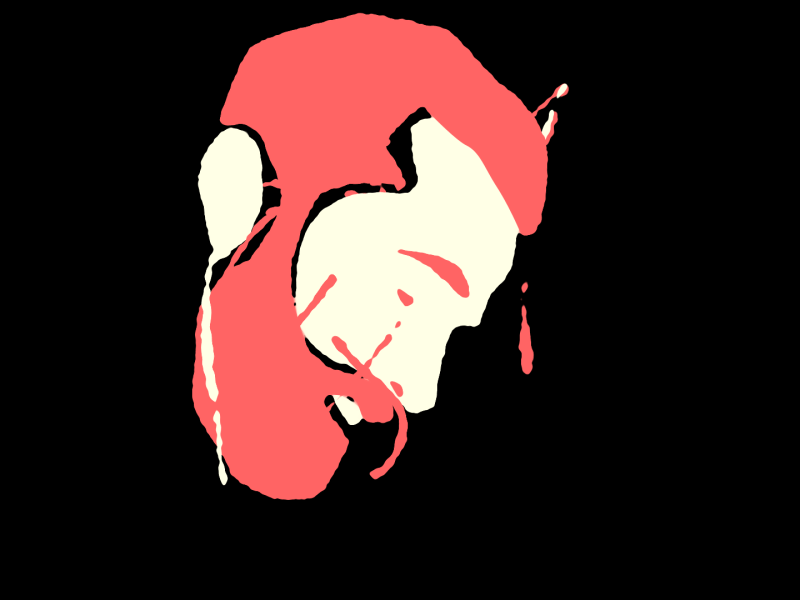
Downvoting a post can decrease pending rewards and make it less visible. Common reasons:
Submit
"Maybe one or two a year (which, in mathematics is quite good!), but apparently not quite good enough!"
OMG. how many papers is enough in mathematics then?
And how about PhD? For a PhD program in mathematics, how many papers are required for graduation ?
Downvoting a post can decrease pending rewards and make it less visible. Common reasons:
Submit
Technically, 1. Your dissertation. Most people end up doing what's known as a 'staple dissertation', i.e. multiple peer-reviewed papers that you are an author in which you put bits and pieces into your dissertation to tell a coherent story.
Downvoting a post can decrease pending rewards and make it less visible. Common reasons:
Submit
You don't know that for a fact.
Downvoting a post can decrease pending rewards and make it less visible. Common reasons:
Submit
Never been able to adequately discern how many papers are good in mathematics. I'd say on the order of 4-5 as an applied mathematician and 1-2 as a pure mathematician. However, I hardly see much difference between the two nowadays.
Downvoting a post can decrease pending rewards and make it less visible. Common reasons:
Submit
What would make you Would say on the order of 4-5 as an applied mathematician and 1-2 as a pure mathematician?
Downvoting a post can decrease pending rewards and make it less visible. Common reasons:
Submit
Hi @complexring! All you said for me is like Chinese to me but here's my upvote for being smarter than me in Math!
I posted about BELIEFS, how they often limit us and how to change them to make them useful instead. AND also talked about math but in a different way haha.
http://steem.link/selfSTEEMbeliefs
Downvoting a post can decrease pending rewards and make it less visible. Common reasons:
Submit
I knew it was more behind that great writing mind! Never ceases to amaze me@complexring!

Downvoting a post can decrease pending rewards and make it less visible. Common reasons:
Submit
Wow! What an exciting post to come across this morning! Welcome aboard the Steemit train and a giant thank you for the info as well as your professionalism and passion. It is contagious!!! Namaste :)
Downvoting a post can decrease pending rewards and make it less visible. Common reasons:
Submit
Do you still get the feeling that you are working on mathematical proofs that are on par with Newton being able to describe gravity? Also amazing read, I wish I could understand more mathematics to understand your perspective more clearly.
Downvoting a post can decrease pending rewards and make it less visible. Common reasons:
Submit
Newton was a physicist ... although, I get your point. Yes and no. Maybe what I do will be used in the future. Maybe it won't.
Downvoting a post can decrease pending rewards and make it less visible. Common reasons:
Submit
Well - some would say he was more an alchemist than a physicist ;-)
http://www.livescience.com/54162-newton-recipe-for-philosophers-stone-rediscovered.html
http://www.alchemylab.com/isaac_newton.htm
But he's of course more known for his contributions to physics...
Looking forward to follow your posts and path ;-) Say Hi to Ashley!
Downvoting a post can decrease pending rewards and make it less visible. Common reasons:
Submit
Agreed, surprising how closely linked mathematics and physics are though. Would Pythagoras be a better example? That is academia, you write A* papers and get published in a high impact journal you have a higher chance of influencing the future/being cited.
Downvoting a post can decrease pending rewards and make it less visible. Common reasons:
Submit
Mathematicians do not tend to go for the high impact journals like Nature and Science.
Downvoting a post can decrease pending rewards and make it less visible. Common reasons:
Submit
[Mistake - Edited]
Downvoting a post can decrease pending rewards and make it less visible. Common reasons:
Submit
Wow. So three thoughts beat out the others in my mind after reading this:
Downvoting a post can decrease pending rewards and make it less visible. Common reasons:
Submit
Thanks for the kind words.
On 3 ... that's a very good idea! I'll have to think about how to properly connect the ideas.
Downvoting a post can decrease pending rewards and make it less visible. Common reasons:
Submit
meep
Downvoting a post can decrease pending rewards and make it less visible. Common reasons:
Submit
Very well, but if nothing is done here, is what will happen to steemit: Read this is very important https://steemit.com/steem/@stea90/read-very-important-why-the-market-volume-and-value-of-steem-continue-to-decrease-what-will-happen
Downvoting a post can decrease pending rewards and make it less visible. Common reasons:
Submit
Thanks for the brain food @complexring! I was thinking that this is the perfect place for academics. Check this out:
https://steemit.com/steemit/@mikeinfla/could-steemit-topple-the-ivory-towers-of-academia
Downvoting a post can decrease pending rewards and make it less visible. Common reasons:
Submit
Nice posting...
Downvoting a post can decrease pending rewards and make it less visible. Common reasons:
Submit
Woah!
Downvoting a post can decrease pending rewards and make it less visible. Common reasons:
Submit
awesome.
Downvoting a post can decrease pending rewards and make it less visible. Common reasons:
Submit
Teslas are love, teslas are life.
Downvoting a post can decrease pending rewards and make it less visible. Common reasons:
Submit
if you could dumb the whole article in english it would be a lot easier to grasp.
nice read though
Downvoting a post can decrease pending rewards and make it less visible. Common reasons:
Submit
You're nicer than a day on the beach. (';')
Downvoting a post can decrease pending rewards and make it less visible. Common reasons:
Submit
Just knowing someone as cool as you will read this makes me smile. ( ^^) _U~~
Downvoting a post can decrease pending rewards and make it less visible. Common reasons:
Submit